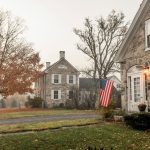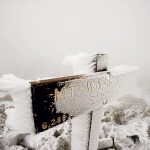Dear Rosalie,
It has taken me almost 40 years to finally ask about you. For years now, I’ve had all the papers my adoptive parents kept. The papers call me simply “baby boy #3331.” They came from the Elizabeth Lund Home for Unwed Mothers, as you knew it then, in Burlington, Vermont.
In the bundle of papers, hand-typed on onion skin, there is the original agreement between my parents and the adoption agency: “If, for any reason whatever during the residence period, we, the adopting parents, shall decide that we do not wish to make this child legally our own, baby boy #3331 may be returned.” I see two small burn holes near my father’s signature. Years later, he would tell me that he was so eager to sign the agreement that his hands were shaking, and ashes had fallen from his cigarette.
There are receipts for fees paid: two payments of $150 each for “adoption services,” $4.50 for probate fees, and $1 to the city clerk for a certified copy of the birth certificate. This, I would later come to understand, was an “amended birth certificate,” one that renamed the characters involved in my beginnings. The original birth certificate was “retained permanently and sealed” according to state regulations, “for 99 years after the date of the adoptee’s birth.”
I wonder what it must have been like for you, Rosalie, when you signed away your rights to ever see me again, to never know who I would become. Did anyone explain to you what we would, and would never, know about each other? Did anyone talk with you about the possibility that someday you might wonder about me, or that I might wonder about you? In Vermont, access to closed adoption records is provided only by court order. But if you had simply signed a consent form, we would be able to contact each other. I imagine such thoughts were frowned upon in 1961.
I don’t know why I waited so long to look for you, but I finally wrote to the Lund Family Center, as it’s called now. The only report I’m allowed to see is referred to as
Nonidentifying Information for Adoptees and Adult Descendants of Deceased Adoptees. Today, waiting in my stack of mail was a large brown envelope from the center. When I opened it, the first thing I saw was that you had named me:
Kenneth. The thought of your giving me a name is so much more tender and reassuring than thinking all this time that you had just relinquished me to some unknown numerical file.
I now know that you were married at the time of my birth. The report notes, “Her husband had deserted her.” What happened, Rosalie? On the next page there is simply one entry under
Birth father: “first name, Kenneth.”
I keep reading: “Rosalie had two previous pregnancies. The first baby was encephalic and delivered prematurely weighing 3 lbs. 8 oz. and lived 10 minutes. The second baby died at 6 weeks due to spina bifida. They were your half siblings.” I don’t know what to do with that. What did you do with that? How could you lose two babies and then give up your third?
There’s an untitled form in the packet with handwritten data filled in under titles such as
Relative, Nationality, Education, Occupation, Health, and
Personality. I see that my uncle, your brother Forrest, was “reliable and industrious.” Aunt Alberta was “hard to get along with, selfish, shy and moody.” Your parents are both referred to as “understanding.” Antoinette “gets along well,” while Howard is “not religious.” Kenneth’s personality is listed as “sympathetic, deceiving, not reliable, ambitious and steady worker.” The handwriting is so difficult to read on this page, but under
Occupation I am sure it says that Kenneth was in the “milk business.” Rosalie, I have to tell you, when I read that I laughed out loud at the thought — my father might have been the milkman.
On the same page I see that you were to enter nurses’ training in 1962, the year after you had me, and that you were 21 and a waitress: “dependable, industrious, good disposition.” What was it like for you, Rosalie, that morning in October 1961, when you went into labor and gave birth to me?
The Report from Supervising Nurse on Deliveries says there were no complications of pregnancy or labor. Was it really that simple? Did you hold me at all? Did you look at me before I was filed away under #3331?
Were you there when they took my footprints, which I see for the first time today, so tiny and crinkly? I counted my toes when I saw them. All 10 toes — a healthy baby boy. I think you might have been there, because in the space marked
Mother’s right index fingerprint something has been covered over so that I cannot see it. The same holds true for the last half of
Infant’s name, Hospital no., and
Prints taken by, all covered over. Rosalie, I have no FBI database of fingerprints in my basement with which to search out and identify you. But knowing that your fingerprint is underneath that tape, evidence of you so close but inaccessible, I want even more to see it. To see you.
In the packet i received today is a list of your wants for your baby, for me: a good education, a Roman Catholic family, other children, to grow up in a small town. I had all of that, Rosalie, and more. I wish you could know the comfort I feel right now writing your name:
Rosalie. That’s who you are. I haven’t known your name until today. I’ve struggled over the years to identify you, to simply refer to you. “Birth mother” is such a technical term, isn’t it? For me, and I mean no ill by this, when I think of “mother” it is Edith I think of, the woman who raised me.
You would have liked her, Rosalie. She was kind and thoughtful, and she loved to laugh. Edith was a Vermont girl, like you. We lived for a while in the little village of Reading, where I remember evening walks up the dirt road. On one of those walks, my sister and I were catching fireflies. When our clenched hands couldn’t hold any more blinking bugs, and still others were flashing around us, Mom put the beetles in our jacket pockets. We walked back home flashing and giggling all the way.
Family was important to her. Every week we had dinner with Uncle Gil and Aunt Bertha, my mother’s brother and his wife. We almost always had spaghetti and meatballs, with Aunt Bertha’s tomato sauce. I remember after dinner, when the grown-ups retired to the living room to listen to Minnie Pearl or Johnny Cash, my sister and I would go down the hall to the room where our aunt kept her collection of salt and pepper shakers.
A whole wall, floor to ceiling, had been devoted to these funny little pairs of kissing Dutch kids, giant rolling dice, coconuts hanging from their own palm tree stand, and hundreds of other variations. We would sit there on the floor and look up at them towering above us and play “I spy” and “What’s your favorite?”
When I was growing up, our home was home to more than just the four of us — my parents, my sister, and me. For as long as I can remember, my mother’s mother, Leila, spent winters with us, unable to keep up by herself with the snow and the cold that held her mountain farmhouse hostage each year from Thanksgiving to Easter. I looked forward to her visits and would sit on the kitchen counter as she baked something every day she was there: doughnuts, the old-fashioned kind, made with sour milk and fried in lard, or cinnamon rolls, with extra spice and sugary frosting. Overlapping her stay would often be one of her sons, my uncle Henry, who also lived alone the rest of the year.
At our house, the front door was always open. After my aunt Dorothy converted to the Mormon faith, our home became known on the missionary circuit as a place to drop in for those homemade doughnuts and sweet cider. A pair of young men would arrive at our doorstep, always in white shirts, dark slacks, and ties, and be seated at our table within minutes. There would always be talk of their missionary work, but my father, a Catholic and a former altar boy, would make it clear that conversion was out of the question.
But have another doughnut, why don’t you? And they would. And six months later, two more would as well.
Who decides what information we can share, Rosalie? In a letter from the Vermont Department for Children and Families, my “request for the release of identifying information” has been denied. Instead, I’ll have to write to the probate court that handled my adoption, outlining my reasons for wanting to know who I am: “The judge will determine whether there is sufficient reason to release identifying information.” Sufficient reason? What if I say I’ll go crazy without knowing the truth? I resent having to prove it, but I admit it’s a good question. Why
am I so desperate to find you, Rosalie? Why now, after all these years?
The fact is I’m not sure. Finding out that you had named me before relinquishing me changed completely so much of what I thought I knew about my adoption. Knowing that you gave birth to, and then lost, two children before me breaks my heart. I didn’t die; I lived more than 10 minutes, I lived more than six weeks. I’ve lived 45 years without you, Rosalie.
Edith died when I was 15. I remember one hospital visit, after the chemotherapy had failed to stop the cancer. My father was sitting on her bed, and they were talking. She whispered to him, “I’m dying for just one cigarette.” He turned off the oxygen and removed the tube from her nose. He lit a cigarette for her, and she was just starting to smoke it when a nurse came into the room. “What are you doing?” she yelled. “You can’t do that in here!” My father backed the nurse up toward the door and said quietly, so my mother wouldn’t hear, “What’s it going to do, kill her?”
I never fully understood what my father was doing that day in the hospital, not until nearly 30 years later, when I’m the one watching him struggling for breath. The doctors tell him they don’t know which will get him first — the emphysema or the tumor in his lung. This man has been such a good father to me, Rosalie, and it hurts so to see him the way he is now, tethered to an oxygen tank and disappearing. The other day I spoke to him on the telephone, and for the first time, he didn’t recognize my voice. “Is my son there?” he kept asking. “Let me speak to my son.”
I don’t know what else to say. I hope you’re still alive. I hope we can find each other. I hope that if I can find you, you’ll want to see me.
Rosalie, can you even think of me as your son? The last time you saw me, if you ever saw me, I was an infant. Now I’m a grown man. Strange, a mother and son to be on such new ground like this — strangers learning our names for the first time. Perhaps we should make up entirely new names for each other. But I wouldn’t want to change yours. For so long I have wondered about you, and today I have a beautiful name to say, a name to call you by. Rosalie, I can’t stop saying your name.
See also:
Adoption Resources.








Hey great story. Fellow Elizabeth Lund Home graduate also. Class of 1964, found my birth mother after 35 years, she had been searching for over a decade, only to later be completely disappointed in her. We don’t talk much anymore. Just confirmed to me how amazing my real mom was. Send me an email if you ever want to exchange stories. Enjoyed your story.
I have info on this writer’s birth family if he has not already found them.
Enjoyed reading this story. Did the writer ever find Rosalie…?